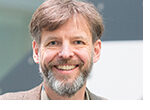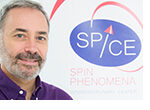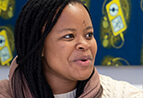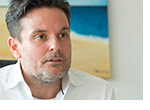 ALEXANDER VON HUMBOLDT PROFESSORSHIP
ALEXANDER VON HUMBOLDT PROFESSORSHIPHighest endowed German research award brings world-class biologist to Mainz University
He is a world-leading cell biologist and chromosome researcher and recipient of an Alexander von Humboldt Professorship, the most highly-endowed research award in Germany: Professor Peter Baumann. In 2017, Baumann left the Howard Hughes Medical Institute in Kansas City in the USA and moved to Germany to work at Johannes Gutenberg University Mainz (JGU), where he supports the strategic realignment and expansion of the life sciences disciplines.
 SPINTRONICS
SPINTRONICS"We need to get out of our comfort zone"
Professor Jairo Sinova came from Texas A&M University to Johannes Gutenberg University Mainz (JGU) in 2014 to take up an Alexander von Humboldt Professorship. He is one of the world's leading researchers in the field of spintronics and has already set-up the Spin Phenomena Interdisciplinary Center (SPICE) and the Interdisciplinary Spintronics Research (INSPIRE Group) at Mainz University.
 CULTURAL STUDIES
CULTURAL STUDIESNew degree course focusing on the translation of indigenous languages
In cooperation with the Universidad Autónoma Benito Juárez de Oaxaca, Johannes Gutenberg University Mainz (JGU) is planning to launch a specialized degree course in translation and interpreting of Mexican indigenous languages. Professor Martina Schrader-Kniffki of the JGU Faculty of Translation Studies, Linguistics, and Cultural Studies (FTSK) in Germersheim is in charge of the project, which is currently entering a decisive phase.
 ATMOSPHERIC PHYSICS
ATMOSPHERIC PHYSICSTracking the climate using MESSy
Professor Holger Tost wants to find out what is going on in the atmosphere and uses computer simulations to investigate the processes influencing our climate and weather. He was appointed to the Carl Zeiss Foundation Endowed Professorship on Environmental Modeling in the Climate System at Johannes Gutenberg University Mainz (JGU) in 2016.
 ISRAEL PROFESSORSHIP
ISRAEL PROFESSORSHIP"We talk about one another rather than with each other"
The first holder of the Israel Professorship at Johannes Gutenberg University Mainz (JGU) takes up his work. Yossi David comes from the Hebrew University in Jerusalem and is joining the Department of Communication at Mainz University. He will be a guest professor for three years with the goal of stimulating German-Israeli exchange in the field of Communication Studies.
 ANTHROPOLOGY AND AFRICAN STUDIES
ANTHROPOLOGY AND AFRICAN STUDIESSouth African exchange student researches underground hip hop
Sikelelwa Anita Mashiyi is the first exchange student to come from the University of the Western Cape to Johannes Gutenberg University Mainz (JGU). A Master's degree student, she is currently undertaking research in JGU's African Music Archives (AMA) on the underground hip hop of South African townships. With the Department of Anthropology and African Studies planning to intensify its partnership with three African universities and to establish a network for research and teaching, further visits might follow.
 GEOINFORMATICS
GEOINFORMATICSA model of urban climate
With the help of ENVI-met, it is possible to determine the microclimate of a city down to the square meter, while effects of construction projects, soil sealing, and green spaces can be exactly predicted. Professor Michael Bruse of the Institute of Geography of Johannes Gutenberg University Mainz (JGU) has been working on this software for 25 years. As time went by, the specialist in geoinformatics incorporated increasingly more factors and made the 3D simulation more complex. ENVI-met is now in use around the world.
By students, with students, for students
In November 2018, Johannes Gutenberg University Mainz (JGU) will be celebrating the first International Students' Conference (ICON). Speakers from all over the world will come together to discuss topics and issues in and around gender, migration and markets, ethics, literature, and a great deal more under the title "Bounds of Humanity". The event will mark the start of a regular series of study conferences at JGU.
 PRISMA CLUSTER OF EXCELLENCE
PRISMA CLUSTER OF EXCELLENCEAttractive internship program for young talent
A special internship program regularly succeeds in getting talented young people to come to PRISMA, the Precision Physics, Fundamental Interactions and Structure of Matter Cluster of Excellence at Johannes Gutenberg University Mainz (JGU). Seven students were welcomed this summer. Zhiyuan Wang is one of them. He took the opportunity to work on his own project in nuclear physicist Professor Dmitry Budker's team.
 UNIVERSITY FUNDING
UNIVERSITY FUNDING"We care about quality"
For twelve years now, Dr. Elke Göbel and Dr. Rainer Göbel have supported Johannes Gutenberg University Mainz in many different ways. Now the husband and wife, both Gutenberg alumni, have set up a foundation that they plan to use first and foremost to promote international students in the Faculty of Physics, Mathematics, and Computer Science.
